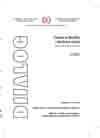Herodot, Kafka pred Zakonom, i višeznačnost kao pokretač književnoga zapleta
Herodotus, Kafka before the Law, and Ambiguity as an Engine of Narrative Plot
Author(s): Dražen PeharSubject(s): Philosophy
Published by: Akademija Nauka i Umjetnosti Bosne i Hercegovine
Summary/Abstract: This essay deals with discourses of ambiguity first by Herodotus (Histories, Book I, “The story of Croesus”), which assumes historical priority, and then by Kafka as exemplified in his story ‘Before the Law’. Both kinds of discourses tell us something important about possible uses of ambiguity as an engine of narrative plot, and also about some viable ways of human coping with ambiguity. Whereas Herodotus, under the standard interpretation, narrates the story of Croesus and of ambiguities of Delphic prophecies in order to present universal weaknesses of human nature, Kafka, while leaning on Herodotus insubtle ways, uses ambiguity to intimate some universal human potentialities as flickering through his own narrative. In addition, Kafka also uses ambiguity to guide the reader to the conclusion that, at some level, both ambiguity and the possibility of meaningful asking of questions meet their end. This enables us to approach Kafka’s narrative universe through a different, retroactive reading and understanding, and also hands us the keys to explain Kafka’s ‘narrative satisfaction at dying’ as a key component of his aesthetics. Kafka is probably the only writer whose narrative mastery managed to reconcile two extremes: to expose every single representation to a subversive impact of ambiguity, and to bring discourse to the point where ambiguity ceases to matter.
Journal: Dijalog - Časopis za filozofiju i društvenu teoriju
- Issue Year: 2011
- Issue No: 03+04
- Page Range: 60-84
- Page Count: 25
- Language: Bosnian

